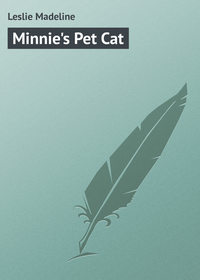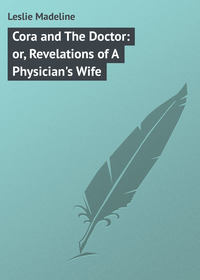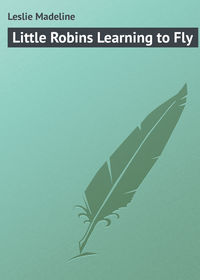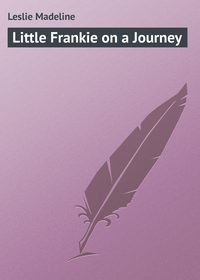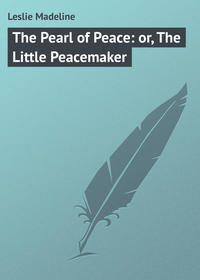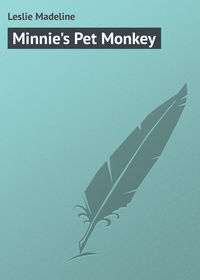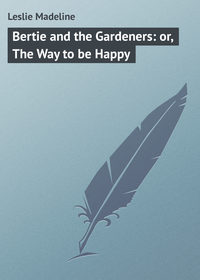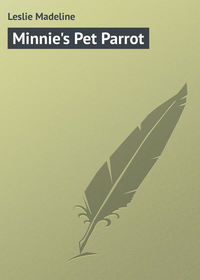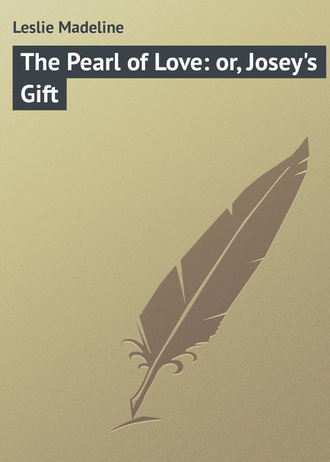 полная версия
полная версияThe Pearl of Love: or, Josey's Gift

Leslie Madeline
The Pearl of Love or Josey's Gift
CHAPTER I.
JOSEY'S RIDE
"Please mamma, may I go to ride with you?" asked little red-cheeked Josey Codman.
Mamma was tying on baby's silk hood, and did not answer for a minute.
"I would let him go," urged Aunt Fanny. "He can sit between us; and he wont be a bit of trouble."
Josey clapped his hands.
"I'm going, mamma, isn't I?"
"Can Nurse get him ready quick enough?"
"Yes, indeed! Run, Josey, for your new hat. Nurse bring his sack from the hall. It's fortunate I curled his hair before dinner. It's all dry now; come, pet, stand still while I baste in a clean ruffle."
Baby Emma didn't like so many wrappings around her neck, and began to throw back her head in an alarming manner. Mamma gave her to Nurse to carry about, while she put on her bonnet. Then the carriage drove to the door. Papa had to be called from his study. Nurse scrabbled on her hat and shawl, and at last they were all seated in the back, and the driver cracked his whip, calling out to his horses, —
"Go on!"
"Why!" said papa, "I didn't know Josey was going."
"But I am. Isn't I, mamma?" cried the boy, his eyes dancing.
"I should think so," answered mamma, laughing. "I don't know as it was best, we shall be out late."
"Oh, we'll manage somehow," said Aunt Fanny, "Josey is such a good boy!"
"Nurse," began mamma, "you must be careful what Josey eats for supper; only bread and butter, with a cup of milk."
"Yes, ma'am."
"And if he grows sleepy before service is through, take off his jacket and let him go to sleep. You will be in Mrs. Reed's nursery."
"Yes, ma'am, where we were before."
"Baby's asleep, so soon," said Aunt Fanny, watching the infant's head nodding over Nurse's shoulder. "Lay her down. She'll sleep all the way, and be as good as a kitten."
"Don't let her soil her new cloak, Nurse," said mamma. "Fanny, the cloak looks beautifully! handsomer than I thought it would."
"I always liked that color," answered Aunt Fanny, "it's real bird of paradise. Untie baby's hood; now Nurse, she'll sleep easy."
Mamma and aunty were on the back seat, with Josey tucked in between them; papa and Nurse, opposite. Papa turned from one to another as they spoke; but he did not listen to a word that was said. There was to be a great meeting in the Tabernacle Church that evening, and he was to preach. As they rode along, his mind was fixed on what he was going to say.
Mr. and Mrs. Codman did not always live near the great city where they were now going. Their home was more than a thousand miles away; but they had come here to reside for a year or two, and had rented a pretty cottage nearly ten miles from town.
On three sides of the cottage, there was a piazza, with pillars all covered with woodbine and honeysuckle. In the barn at the end of the garden, was a horse which the clergymen used for his daily ride to the Post Office. When they went to town, they always hired a hack from the stable.
Mr. Codman was a very learned man, as well as a faithful, devout minister. Everybody loved him, for he loved everybody, but especially little children. If he were riding through the village, he always liked to watch the boys at their play, or the little girls trundling their hoops. Whenever there was a cry of distress he was off from his horse in a minute, ready to assist the child who had fallen, or to relieve any one of their troubles.
The children of course loved him. Many a time in the early spring, as he came out of his gate in the morning, he would find a group of them standing there to say "good morning!" or to offer him a bunch of violets.
Sometimes papa took Josey on the saddle before him; and then how the children would shout with glee, and press up to speak a word to the pretty boy.
Mr. Codman was not the minister of the village, though he sometimes preached for the clergyman; but he always improved every opportunity to tell those around him of the love of God, who sent his only Son into the world to save sinners.
CHAPTER II.
THE TWO NURSES
At seven o'clock Mr. and Mrs. Codman and Fanny started for church. Dr. and Mrs. Reed went, too; and another clergyman with his wife, by the name of Matthews. Mrs. Matthews had been invited to tea, and had brought her baby, a little girl, nearly the same age as Mrs. Codman's.
Soon after they were gone, Ann perceived that Josey was sleepy, and easily persuaded him to lie down on the bed. Then the two nurses, having had their supper, began to chat, while they tended the babies.
"Look now!" said Ann, dancing Miss Emma on her lap, "the two of them look as much alike as a pair of kittens."
"Except," answered Martin, "that your Miss has black eyes; and mine, blue."
"That's true for ye, but then their mouths are the same, and sure enough I thought before, that no baby could equal ours for a small mouth."
In the mean time Emma and Rose cooed and coquetted with each other in the very best of spirits, until a late hour, when they both went quietly to sleep.
"Feth and a pretty sight they're making," suggested Ann, pointing with some pride to the bed; the two little ones lying side by side, and Master Josey across the foot, with his rosy cheek resting on his hand.
"It looks for all the world like a baby asylum," was Martin's laughing reply.
"I wonder what Mr. Codman is preaching about," she added; "I would like to be within sound of his voice, it's a treat to hear him."
"I heard Miss Fanny saying to her sister that the text was to be from Ephesians 4:32. 'Be ye kind one to another.' You know it's before the 'Young Men's Society,' he's preaching to-night."
"And fine words they are to put before any society. I'll ask Mistress to tell me about it to-morrow. Sure, I've read in some good book, that kindness to every one would just turn this wicked world into a heaven, like where the angels live."
"I believe it would," replied Ann, "for if everybody loved, sure there'd be no stealing, nor lying, nor any such wickedness. And then, why, there would be no prisons, nor jails. Indeed, Martin, I think it must be the finest text in the whole Bible."
"Because," added Martin, in an approving tone, "the greatest kindness of all was, when the Lord of glory himself loved us poor sinners so well that he couldn't bear to see us ruined forever, and so he gave himself to die on the cross in our stead."
"Would we have had to die there, if he hadn't?" asked Ann, with a look of awe.
"Not just there, maybe; but we would have had no hope of being happy, because there was God with a sword over our heads; and he couldn't take it away, till somebody, equal to the whole world of people, suffered the penalty in our stead."
"I see it now, I've heard Master explain, that Jesus being the Son of God, his blood was more precious than the blood of all the human race; and if all the sins of all the people were washed in it, there still would be enough to save millions on millions more."
"Well," murmured Martin, after a pause, "we can't be kind enough to people after such an example as the Lord has set us."
The great clock on a neighboring church struck nine.
"They'll soon be home now," she added, springing to her feet, "I'll just bring my baby's cloak and hood from the closet, and have them ready."
"It's a fine night for a ride," said Ann, bringing Josey's coat and cap, and laying them on a chair. "Baby slept all the way into town, and I expect she'll sleep going home."
"You have to go nearly twice as far as we do. It's scarce six miles to Easton Parsonage; but then Mr. Matthews is a very careful driver; Mistress would like to ride faster than he drives; I wish we were going the same way!"
Every moment footsteps were listened for; but not till half-past nine did a carriage drive to the door. Then Aunt Fanny and Mrs. Reed ran up in a great hurry.
"Come, Ann," said Miss Fanny, hurriedly, "we're late and must be off in a minute. You put on your sack, and I'll dress Josey. Mrs. Reed has offered to put on baby's cloak and hood; and, Martin, you had better get on your bonnet, for the other carriage, with Mrs. Matthews and Mrs. Codman in it, will be here directly."
The two nurses ran to the back room, where they had taken off their outer garments, and in less than five minutes, Miss Fanny appeared with Josey asleep on her shoulder, and Nurse behind her with baby Emma, closely wrapped in her cloak and hood.
Mr. Codman cut short his wife's "good byes," by saying, —
"It will be midnight, wife, before we reach home;" so, with hasty adieux, they jumped into the carriage and drove off.
Mr. and Mrs. Matthews followed directly, turning down the opposite street, Martin screening her baby's face from the night air by a thin veil.
It was a bright, beautiful evening, but rather cool. Mr. Codman held Josey close to his breast; and his wife, with a warning to Ann to keep Emma well covered, began to talk earnestly about the sermon.
CHAPTER III.
THE WRONG BABY
In this way they rode on for four miles. "Almost half way," Fanny observed, as they passed the five corners; "I suppose Mr. and Mrs. Matthews are home by this time."
Just then, Josey awoke with a start and cry of alarm, which roused his sister, and made her open her eyes. Fanny, who sat opposite, pulled back her hood to quiet her, when, with a shriek, mamma cried out, —
"We've got the wrong baby! Oh, Nurse, you made a mistake! This is Mrs. Matthews' Rose. Husband, stop the driver, quick!"
"Are you sure?" asked papa, who had been taking a short nap.
"Sure? Can't I tell my own baby? Emma has black eyes; and, look for yourself, is this my baby's dress?"
"I see no difference, my dear."
"But, Frederick, it's awful, and every minute we're going farther away from our little darling."
"Well, my dear, if you are positive, we must turn back, but it is a great pity such a mistake was made."
"Mrs. Reed dressed both the babies," explained Aunt Fanny, trying to recover her senses, after the fright.
"And I only carried down the one she gave me," argued Ann, choking back a sob. "I saw it was our baby's cloak, and I never mistrusted the right one wasn't inside of it."
It was a difficult matter to make the driver comprehend that he was expected to go eight or ten extra miles to change babies.
"Why isn't one as good as t'other?" he asked, grumbling. "The horses 'll never go through with it, and at this time of night it's no use."
But Mr. Codman, who was now wide awake, and well understood the distress which agitated his wife, without the squeeze she was giving his hand, and her continual "Oh dear! Oh, my poor baby!" now said, firmly, —
"We wont waste words about it. We must go to Easton parsonage as quickly as possible."
"I'll take the short cut, then, across the moor. The moon is so bright I can keep out of the ruts."
"But then we lose the chance of seeing them. They may have found out the mistake earlier, and be on the way to meet us. Drive on!"
But driver still demurred, muttering that it was a bad job, and he couldn't be going over the ground four times without good pay.
"How much do you want for yourself?" asked the gentleman. "I hire the carriage by the month."
"A couple of dollars is little enough."
"I'll give you three; now drive on."
The carriage door shut with a snap, and they started off, driver lashing his horses with the whip.
"We must look out that they don't pass us," said the clergyman.
"I'll keep watch," responded Aunt Fanny, decidedly. "I wonder what Josey would say if he were awake?"
"If our driver had been a father," exclaimed Mrs. Codman, "he wouldn't have asked why one wouldn't do as well as t'other."
"Hem!" exclaimed Aunt Fanny, indignantly. "'Twouldn't have hurt the man to have heard your sermon to-night, brother. I don't think he's very kind, any way."
"He was probably at the ale-house, and had taken enough to make him cross."
"Had he heard you describe how God rewards our love to others by peace in our own hearts, he would have been more kind."
"Well, Fanny, be as tender in your thoughts as you can. It is hard for the man to lose three or four hours of his sleep."
"O, you always are ready to find excuses!" she answered, laughing.
"I ought to practise what I preach, oughtn't I?" He looked archly in her face.
"I hope Emma wont wake," said mamma, anxiously. "Little Rosa sleeps as quietly as a kitten. How strange that none of us noticed the change."
"It's no joke," said Fanny, though she could not help laughing.
They were going over a rough part of the road, and Josey, after growing restless, suddenly started up.
"Are we most home?" he asked in a sleepy tone.
"We'll get there by and by," answered his father, cheerfully.
"I'm afraid we shall have to go all the way to Mr. Matthews'," said mamma. "Next time, I'll dress baby myself.'
"Miss Fanny sent me to put on my bonnet," urged nurse. "She said you were in a hurry."
"No one is to blame, nurse," said her kind master. "It is simply unfortunate."
Mile after mile they drove on, only meeting an occasional carriage, until they came in sight of Easton Parsonage. Here the lights were all out, except one in the chamber; and there persons could be seen moving about.
A vigorous knock soon brought Mr. Matthews to the door. "I heard wheels," he said, "and more than half suspected who it was. We made a sad mistake."
Martin came down, her face very red, bringing baby Emma, and Ann gladly gave up her charge.
Mrs. Matthews soon appeared with marks of tears.
"Wasn't it dreadful!" she exclaimed, with a fresh burst of grief. "I wanted to go right back. We were only two miles from the city when we found out we had brought away the wrong baby; but Mr. Matthews said no, we must keep her till morning. He thought it very careless of us, but" —
"There was no carelessness about it," urged Fanny, indignantly. "Mrs. Reed wanted to help; and she put on the wrong cloaks, that was all. There was never a thought with us of not coming back. Brother wouldn't have hesitated if it had been twice as far. We knew you'd want your baby, and we wanted ours."
"I thought you would understand that we should keep your little Miss till morning," explained Mr. Matthews.
"But mothers have such tender hearts," added Mr. Codman, "and we ought to thank God for it. Come, wife, we must be off. We have fourteen miles to go, and it's almost twelve o'clock."
"There's a difference in ministers as in other folks," whispered Martin aside to Ann. "Mr. Matthews scolded well, and wouldn't hear of going back; but your master did as he would be done by."
"Just like his text," returned Ann. "'Be ye kind one to another.'"
CHAPTER IV.
JOSEY'S TEMPER
It was a little past two when the weary family alighted at their own door. For the last few miles, the moon had been clouded; the horses were tired; and they had to drive with care.
"Tell Cook we'll have a late breakfast," said mamma, taking her babe with a kiss. "Now, Nurse, go and get all the sleep you can."
The following morning, Josey couldn't remember coming home at all. He opened his large hazel eyes very wide, as Aunt Fanny told him what had happened.
"I'm glad we found her; isn't you?" he asked, again and again.
Baby Emma received a great many extra kisses that day, and the next, and whenever mamma thought about the mistake. But one week after another passed on, Mr. Codman preaching once in a while, until Spring came again.
When Emma was a year and a half old, she was full of mischief; and Josey, who was now five, sometimes got out of patience. He was just learning to read, and liked nothing better than to sit on Aunt Fanny's knee and hear her tell stories. Sometimes Emma, finding no one watching, would get to mamma's basket and overturn all the spools, or tangle the thread, and then Aunt Fanny had to start up and attend to her, and stop the stories very short.
Or baby would climb on a chair to her brother's shelf and pull his nice books to the floor. Once, indeed, he came in from a walk, and found mamma busy with a caller, and Emma, who had been left there while Nurse went an errand, doing a great deal of mischief. She had a new book in her hand, and just as he found her she was tearing out three or four leaves, laughing and shouting with delight. Josey ran to take his book away; but it was too late. His Christmas present was spoiled. Poor boy! he cried as if his heart would break, and was very angry with his sister, more so than his mamma had ever seen him. He struck her little fat hand, exclaiming, —
"You are naughty! naughty! and I don't love you any more."
The visitor rose to go, and Mrs. Codman did not detain her. She was so grieved at her little boy's actions, she could scarcely command her voice to say "good-bye." She rung the bell for Ann, and then, taking Josey by the hand, led him away to his own chamber.
He glanced up into his mamma's face and saw it was very white, and he began to be sorry for his bad temper.
"Oh, Josey!" she commenced at last, seating him on her knee, "do you know how you've grieved mamma?" and then the tears began to roll down her cheeks.
"Emma tore my best book," he said, softly.
"Emma is only a baby, Joseph, and didn't know any better. If you hadn't struck her, papa would have bought you another one. But, Josey, you gave way to your anger, and told your darling little sister that you didn't love her."
"I think she's too big to tear my pictures out," he said, sighing.
"She must be taught to let your things alone," answered mamma, "and you must remember to put them out of her way; but all the pictures in the world wouldn't excuse you for treating her so unkindly. Don't you remember that pretty verse you learned last Sunday? 'Be kindly affectioned one to another, in honor preferring one another.' Papa explained to you what it Meant."
"I'm sorry, mamma; but I want my pretty book."
"I'm sorry, too."
She said these words in such a sad tone that Joseph softened at once. He threw his arms around her neck, exclaiming, —
"Mamma, I'm going to be good and love God like little Samuel in the temple."
She held him close to her breast, whispering, "'He who loveth God, loveth his brother also.' This is what St. John tells us. 'If a man say, I love God, and hateth his brother, he is a liar.'"
"Oh, mamma! I'm real sorry."
"And he says, too, 'My little children, let us not love in word, neither in tongue, but in deed and in truth.'"
"What does that mean, mamma, to love in deed?"
"It means that it does no good merely to say 'I love you, I love God;' but we must show it by our actions."
"How could I show Emma, mamma, when she was tearing my book?"
"Think for yourself, Josey."
He looked very serious, his cheeks growing more and more red, but at last he said, softly, —
"I might have taken the book away, and put it up high; and I might think, 'She is so little, she don't know any better;' and after I said, 'naughty, naughty!' as you and papa do, then I could kiss her."
"Yes, my own darling, that would have been Christ-like, loving, kind, and forgiving; and your heart, instead of burning with anger toward your precious sister, would have been filled with the sweetest emotion, such as is implied by the words, 'Be kindly affectioned one to another.'"
"May I go and kiss Emma now, mamma?"
"Yes, darling; and I hope you will learn how pleasant love is, especially between brothers and sisters."
CHAPTER V.
JOSEY'S CHRISTMAS
Spring, Summer, Autumn, Winter, had come and gone; and now Josey was seven years old, and Emma was baby no longer. There was a tiny girl in the cradle who was named Grace. The family had returned to their own home; Mr. Codman preached to his old people.
Aunt Fanny was still with them, though she had agreed to go on a mission to India with a gentleman now studying for the ministry. She was the same ardent girl as before, loving her brother's family, and devoted to their comfort.
Joseph had from his birth been much in her care and was a prime favorite. She had grieved with his parents at the unkindness and impatience he had sometimes shown his sister; and she rejoiced with them that he was becoming so kind and affectionate.
Though Joseph was so young, yet his parents hoped he had become a lamb of the Good Shepherd. He had faults, as all children have; but he tried to correct them. His face sometimes flushed when Emma teased him or meddled with his books, of which he was very careful; but he never struck her now, and seldom was angry but a minute.
"I try to think," he said to his mamma, "that she don't know better, and that she's almost always good; and if I wait a minute and remember about Christ forgiving me, then I feel happy right away."
Josey showed in one way that he was a Christian child. He loved everybody, and tried to be good to all.
Among the poor people belonging to his father's church, no one was more welcome to their humble cottages than little Josey. He always had a pleasant word for each, and often spent hours of his play-time in reading to the old women of the parish.
At Christmas, his greatest treat, and one that he spent weeks in preparing for, was to take his box sled (the one he drew his sister in,) and fill it with the presents he had prepared for his friends.
"Though they are poor," he said, over and over, "I love them dearly, and I want to have them know it." So he spent all his pocket-money in buying what mamma and Aunt Fanny thought would be useful.
A pair of mittens for one poor orphan, a flannel shirt for a rheumatic old man, a pair of glasses for another, and plenty of pies, which he had hired cook to make. He hired her, because he wanted to feel that the gifts were his and not his mother's.
Do you wonder every body, rich and poor, loved him, and that, wherever he went, blessings were showered on his head?
I don't mean those worthless words that so many beggars use without meaning: "A thousand blessings on your head, Miss."
Oh, no! But real, heart-felt prayers that God would be his Father and Friend forever.
Do you suppose Josey was a cross, sulky boy? Can you imagine him wearing a frown? or with his lips in an ugly pout?
No, indeed! It is not possible for one who cultivates such love for all around him; for one who tries in this way to imitate the example of his blessed Saviour to be unhappy or cross. Those children who think only of themselves, who are selfish and greedy, who never heed the blessed words, "Be ye kind one to another," are the persons to wear sour faces and pouting lips.
Don't you remember what the good Book says, "Her ways are ways of pleasantness and all her paths are peace." That means Wisdom's ways, and one of these paths is love; love to God and love to those around us.
You can well imagine that Josey's father and mother, and aunt and nurse, were delighted in seeing him growing up to be a good boy; and each of them were ready to assist him in correcting his faults.
He was neat and orderly; keeping his little treasures arranged nicely in the drawers mamma gave him, and his clothes each on their own hooks in his closet. But Joseph was not always prompt in attention to his duties. He liked so much to hear the talk at table or at the fireside, that it was a real trial to him to leave the pleasant company, and the delightful things that were being said; and he often lingered when he ought to have been on his way to school.
Aunt Fanny used sometimes, by an anxious glance toward the clock, to remind him of his duty, for she hated to have her favorite reproved; or his mamma would say gently, "You'll be late again, Josey." If the conversation was very interesting, he would only push back his chair a little and wait for papa to say, —
"My son, go this moment."
One day his mamma had a long talk with him on the subject of procrastination, after which he did much better.
She explained to him that the meaning of the command, "Honor thy father and thy mother," was not only that a child must obey when told to "go" or "stay;" but he must strive in every thing to act as would please them. He must honor them by anticipating their wishes, by acting when they were absent as he knew they would approve if they were present.


